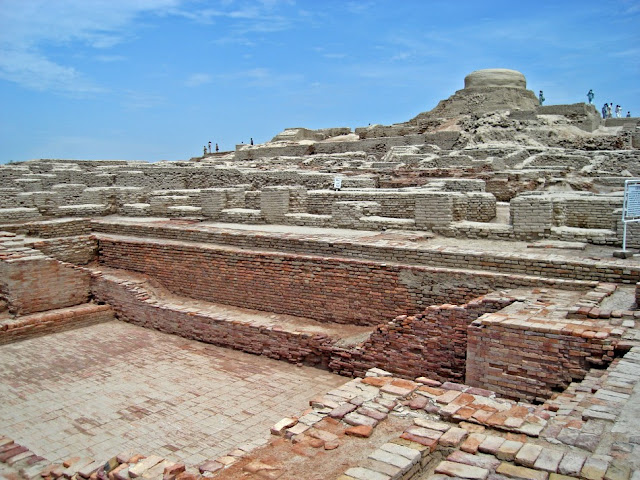The New New World
Americans visiting Dubai know how 19th-century Europeans must have felt when they saw the United States.
DUBAI—Foreign travelers visiting New York or Chicago in the 19th century often came away with mixed impressions. Some found American cities ugly by comparison to their European counterparts: They seemed vulgar, blatantly commercial, lacking in taste. The natives had higher living standards, but they were crude, and the ethnic mix—German, Irish, Italian, Jewish—was terrifying.
A few sensed that there might be something in this new civilization worth admiring. "It is an absorbing thing to watch the process of world-making—both the formation of the natural and the conventional world," wrote Harriet Martineau, an English traveler, in 1837: "I witnessed both in America; and when I look back upon it now, it seems as if I had been in another planet."
I thought about those old visions of urban America not long ago while strolling through the Marina, a neighborhood in "new" Dubai (as opposed to "old" Dubai, mostly constructed in the 1970s). The architects were hired in 1999; the first phase was finished in 2004; soon the Marina will contain 120,000 people, along with hotels, restaurants, yacht moorings, shopping malls, and canals meant to remind visitors of Venice. It might go bankrupt, and it has once already—Dubai is plagued by an overabundance of real estate—but dozens of brand-new skyscrapers, some still with their scaffolding around them, are nevertheless pushing upward around the Persian Gulf, while the sand behind them is being surveyed for more buildings.
The Marina, to a jaded American eye, is incurably vulgar. So is the rest of the city. There is almost no evidence of history or of local culture. International brand names are plastered everywhere, from Applebee's to Rolex, and everything is imported, from the raw fish at Nobu to the coffee at Starbucks. In Abu Dhabi, the emirate down the road, they've even bought the names Louvre and Guggenheim and are constructing museums to match. I am instinctively appalled—how can you buy the Louvre?—but perhaps visiting Europeans once felt the same way about Henry Frick's New York mansion and the Old Masters within it.
And just as Europeans found it odd to see their own architecture copied and altered in America, I found it odd to find American architecture copied and altered on the Arabian Peninsula. Sometimes there are local elements—the odd Arabian Nights turret, a fake "souk"—but the tallest building in the world, the Burj Khalifa, distinctly resembles Chicago's Willis Tower, which also used to be the tallest building in the world. This is no accident: Both buildings were designed bySkidmore, Owings & Merrill, also from Chicago. If the fountains around the Burj Khalifa (illuminated by 6,600 lights at night) seem like something out of Las Vegas, that's no accident, either: They were designed by the same company that built the fountains at the Bellagio Hotel.
Like Europeans once impressed by America's wealth, I am startled by the wealth of Dubai's inhabitants and visitors. Someone must be buying all those Rolexes and staying in the executive suites at the Armani Hotel. I am also intrigued by the ethnic mix. Indian, Nigerian, Japanese, British, Russian, Filipino, and Australian sunbathers mix on the Marina's beaches with the occasional Emirati in a white headdress. Women in bikinis walk by women in burqas. Everyone talks on cell phones.
Yet this apparently harmonious, multiethnic society has a dark side. Occasionally, the invisible Arab police state arrests a tourist for an alleged indecent gesture or deports somebody without explanation. Nobody protests, because almost nobody "lives" in Dubai, in the sense that a 19th-century immigrant lived in New York. Fewer than 20 percent of the 1.7 million inhabitants of Dubai are citizens. The rest are expat bankers and traders—there is no income tax in Dubai—or low-wage laborers, mostly from South Asia, some of whom live like indentured servants.
No wonder they aren't bothered by the vulgarity of the place: They're probably going to move somewhere else next year anyway. A transient population isn't likely to launch a movement for democracy or political rights. If they protest, they risk expulsion. The natives aren't excited about the prospect of majority rule, either, since the majority is foreign. That's why you've heard nothing about Dubai since the start of the Arab spring.
Like the Europeans before me, I resist the idea that Dubai heralds the civilization of the future. But I have to concede that in some senses it might. Not only Singapore and Hong Kong but parts of central London now populated by transient bankers and their semi-legal Filipino servants have more in common with Dubai than with their own hinterlands, even if the architecture is different. I can also see how Dubai, which is clean, law-abiding and well-run, might seem like a safe haven if one were coming from a messy, violent society such as Pakistan or even Russia.
To me, it seems stultifying as well as strange: Like Harriet Martineau, I feel as if I had been in another planet. Yet there have always been people who dream of escaping from their culture, who long to forget their history, and who are content to live without the past. And now, in Dubai, they can.


Comments
Post a Comment